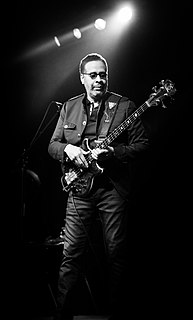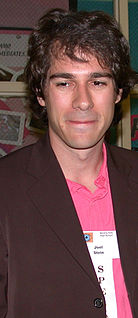A Quote by Steven Pinker
The way to understand how different species evolved is to think about the niches that they fill in an ecosystem - basically, how they make a living.
Related Quotes
Everything that you've learned: 'Make a lot of money, have a nice house'. But they never teach you at school how to relate, how to communicate with others, how to share values with others. ...They teach you how to make a living. You become an optometrist, he becomes a physicist, she becomes a structural engineer, he's an architect. In the future, none of that. Everybody is trained to be a generalist, so they understand different cultures, different values, how we get to be the way we are. So no-one can ever use you for war or killing anybody or hurting anybody
Vampires as creatures have evolved over time as different vampire bloodlines have hit different populations of humans. Every once in a while the blood will make something new and mutate into a new species with different powers, abilities, weakness, physical characteristics, and so on. I don't want to give anything away, but there are whole species and branches that date all the way back to pre-modern times.
You know what I was thinking about on my way home? How different my life would be if you’d made that gash a little deeper. Or how different yours would be if I’d vaulted myself off a roof nine years ago. Do you ever think about things like that? Like, if either you or I wouldn’t have made it, where would the other one be right now? It was something I thought about all the time: how death changes every remaining moment for those still living.
The way the world works now, the way the rules of engagement operate, you can't claim to make sense out of the exterior without booking voyages into the interior. Think about it: How can you understand 'it' if you haven't made any effort to understand 'you'? Because what you're really doing is establishing a living, electrical, vital, energetic connection between it and you. You're creating both of them, simultaneously. A lot like quantum physics.
To spend any time with someone who is among the top five film composers of the last 50 years is pure gold dust. I mean, not necessarily stylistically, because everyone is different in what their music sounds like, but the approach and how to look at a film, how to think about a film, how to decide what you want to do, how to think about characters, how to think about art, how to think about narrative, how to liaise with producers, how to liaise with directors.
I actually think that bass is probably the instrument that has evolved in a quantum leap compared to other instruments. It's the instrument that's evolved the most, especially with how it's perceived. And even how it's played, and how it's viewed from a point of view of commerce, like with the music industry.
There are about 250,000 different species of fossil plants and animals known . . In spite of this large quantity of information, it is but a tiny fraction of the diversity that [according to the theory] actually lived in the past. There are well over a million species living today and . . [it is] possible to predict how many species ought to be in our fossil record. That number is at least 100 times the number we have found.
We are all together in this, we are all together in this single living ecosystem called Planet Earth. As we learn how we fit into the greater scheme of things, and begin to understand how the system works, we can plan ahead, we can use the resources responsibly, to show some respect for this inheritance that goes back 4.6 billion years.
We think of music as this substance that flows - you turn on the tap, and there it is, streaming off your computer - but that's not how we evolved as a species. We evolved to listen to each other, and the reason we're able to listen to music in the terms is talking about is because we're really good at listening to each other. But this kind of technology has allowed us to forget that music is the sound of each other.
I've basically been able to do everything, I basically run my own career and the decisions I make - whether it's how I'm gonna roll out music, how I'm gonna play on tours, different strategies for releasing and marketing things - and that comes from being college educated and someone who's interested in that side of the business rather than only the music. If anything I think that's where the biggest direct influence comes from.
Certainly, we all have within us the potential to live in a hugely different way. And how happy you can make yourself, I think, a lot depends on how much you beat yourself up about that; and how much you can, in some sort of providential way, console yourself and say, 'Well, it's all worked out for the best, in the best of all possible worlds.'




































